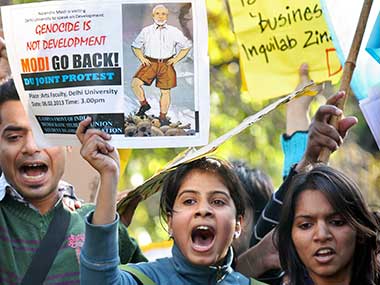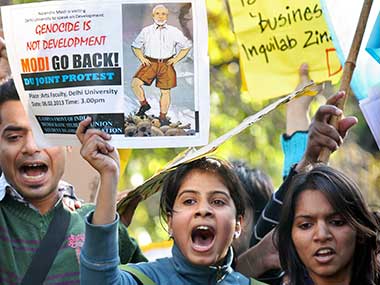New Delhi: Anmol Ratan, a Phd student at Delhi University’s History department, believes Narendra Modi is no Superman. “Modi is just playing a smart game with the frustrated youth of this country who are actually very angry with the lack of opportunity and career growth and are hoping that a Superman will come and save them. And Modi is trying to pose as that Superman. Fundamental changes are what India needs, a superman can’t save India,” says Ratan about the BJP’s PM candidate and his appeal among young voters. Ratan belongs to the ultra-left student organisation All India Students Association (AISA), which recorded its best performance yet in terms of vote-share in the Delhi University Students Union (DUSU) elections held earlier this month. Delhi University, an ABVP-stronghold, continued to be dominated by the BJP students’ wing, which won three of the four DUSU posts this time. Given Modi’s focus on winning the youth vote and the his knack for attracting extreme reactions, his recent elevation as BJP’s PM candidate is bound to have an effect on student organisations and influence campus politics in the run-up to the Lok Sabha elections next year. [caption id=“attachment_1129779” align=“alignleft” width=“380”] File photo of protests against Modi by DU students. Reuters[/caption] After all, Modi’s polarizing effect was on full display at the Delhi University campus earlier this year, when his address to students of Sri Ram College of Commerce was marred by
protests by left-wing student groups from DU
and
JNU shouting anti-Modi slogans
. Indeed, the impact of Modi’s ascension is already being felt in Delhi’s campuses. While his promotion has been credited by some for ABVP’s success at the recent DUSU elections, it has also charged up student organisations opposed to his politics. “In the coming days, we are going to initiate a national campaign exposing the truth about Modi. It will be youth and student-centric. Modi appears on the front pages of newspapers everyday but the facts about him are not reaching people,” says Ratan, speaking about AISA’s plans to challenge the Modi phenomenon. Observing that a communal frenzy is being created in the country, AISA’s Piyush Raj, former joint secretary of the JNU Students Union, says the aim of the campaign would be to unmask Modi’s brand of politics and debunk his claims about development. “We have done it in the past, now we will intensify our campaign. It is political challenge that we as students have accepted. It will be a nation-wide campaign that will continue till elections…Ultimately, students, youth and common people will reject both Modi and Rahul,” says Raj. AISA bettered its tally this year in JNU by winning all four seats in the student union. ABVP’s Aman Awana, the newly elected president of the Delhi University Student Union, however, doesn’t seem too concerned by the opposition to Modi, describing it is ‘not a serious issue.’ But he agrees, that “Modi will definitely impact student politics because he is considered an idol by the youth. While I would give credit for the DUSU win to the hard work of ABVP students, Modi’s projection as PM definitely helped energise the youth”. Dismissing the opposition to Modi and the labeling of his politics as being communal, Awana says, “It is a natural thing that when someone becomes popular, there will be people who want to oppose him. It is not a major issue that some student organisations are opposing Modi. The main thing is that support at the grassroots level is with Modi.” Adds ABVP’s Parvesh Malik, a Literature Honours student at DU’s Ramjas College reacting to Modi’s communal tag, “Who is not communal nowadays. If Modi is communal, everyone is communal.” Dubbing students opposing Modi as ‘naxalites’, Malik says the opposition is simply outnumbered by Modi’s supporters. Reacting to protests by left-wing student organisations that dominate the JNU campus, Malik says, “JNU is much smaller than DU. The majority are with Modi.” But AISA’s Ratan insists the ‘Modi wave’ has more to do with the hype than with reality. “Do we have any evidence to say youth in Delhi is crazy about him? Up until now, it is all media hype. There is no evidence to show that his popularity cuts across social and political lines…The crowd that follows Modi is a constructed crowd. There is no frenzy. I don’t see students putting up Modi posters in their rooms.” Asked whether BJP’s choice of Modi as their PM candidate would lead to more debates on campus and get more students involved and interested in the outcome of the next elections, Ratan said, “We want to pose this question, why is that when one criticises Manmohan Singh or Prakash Karat or Sonia Gandhi, it is perfectly fine. But the minute we criticise Modi, you are seen as anti-national. Who is responsible for creating this intimidating environment? This is dangerous for democracy.” He adds, “Irrespective of what Modi will do if he becomes PM, what is being done as part of the campaign for his PMship is very dangerous. We’ll explain to people that it is this kind of tendency that breeds fascism. The space to criticise should always be there. With Modi’s coming this ethic of democracy is weakening. That is why we are so passionate about taking on people who are so vocal in their support for Modi. This fight is not only to expose Modi but also save to democracy.”
File photo of protests against Modi by DU students. Reuters[/caption] After all, Modi’s polarizing effect was on full display at the Delhi University campus earlier this year, when his address to students of Sri Ram College of Commerce was marred by
protests by left-wing student groups from DU
and
JNU shouting anti-Modi slogans
. Indeed, the impact of Modi’s ascension is already being felt in Delhi’s campuses. While his promotion has been credited by some for ABVP’s success at the recent DUSU elections, it has also charged up student organisations opposed to his politics. “In the coming days, we are going to initiate a national campaign exposing the truth about Modi. It will be youth and student-centric. Modi appears on the front pages of newspapers everyday but the facts about him are not reaching people,” says Ratan, speaking about AISA’s plans to challenge the Modi phenomenon. Observing that a communal frenzy is being created in the country, AISA’s Piyush Raj, former joint secretary of the JNU Students Union, says the aim of the campaign would be to unmask Modi’s brand of politics and debunk his claims about development. “We have done it in the past, now we will intensify our campaign. It is political challenge that we as students have accepted. It will be a nation-wide campaign that will continue till elections…Ultimately, students, youth and common people will reject both Modi and Rahul,” says Raj. AISA bettered its tally this year in JNU by winning all four seats in the student union. ABVP’s Aman Awana, the newly elected president of the Delhi University Student Union, however, doesn’t seem too concerned by the opposition to Modi, describing it is ‘not a serious issue.’ But he agrees, that “Modi will definitely impact student politics because he is considered an idol by the youth. While I would give credit for the DUSU win to the hard work of ABVP students, Modi’s projection as PM definitely helped energise the youth”. Dismissing the opposition to Modi and the labeling of his politics as being communal, Awana says, “It is a natural thing that when someone becomes popular, there will be people who want to oppose him. It is not a major issue that some student organisations are opposing Modi. The main thing is that support at the grassroots level is with Modi.” Adds ABVP’s Parvesh Malik, a Literature Honours student at DU’s Ramjas College reacting to Modi’s communal tag, “Who is not communal nowadays. If Modi is communal, everyone is communal.” Dubbing students opposing Modi as ‘naxalites’, Malik says the opposition is simply outnumbered by Modi’s supporters. Reacting to protests by left-wing student organisations that dominate the JNU campus, Malik says, “JNU is much smaller than DU. The majority are with Modi.” But AISA’s Ratan insists the ‘Modi wave’ has more to do with the hype than with reality. “Do we have any evidence to say youth in Delhi is crazy about him? Up until now, it is all media hype. There is no evidence to show that his popularity cuts across social and political lines…The crowd that follows Modi is a constructed crowd. There is no frenzy. I don’t see students putting up Modi posters in their rooms.” Asked whether BJP’s choice of Modi as their PM candidate would lead to more debates on campus and get more students involved and interested in the outcome of the next elections, Ratan said, “We want to pose this question, why is that when one criticises Manmohan Singh or Prakash Karat or Sonia Gandhi, it is perfectly fine. But the minute we criticise Modi, you are seen as anti-national. Who is responsible for creating this intimidating environment? This is dangerous for democracy.” He adds, “Irrespective of what Modi will do if he becomes PM, what is being done as part of the campaign for his PMship is very dangerous. We’ll explain to people that it is this kind of tendency that breeds fascism. The space to criticise should always be there. With Modi’s coming this ethic of democracy is weakening. That is why we are so passionate about taking on people who are so vocal in their support for Modi. This fight is not only to expose Modi but also save to democracy.”
Modi's rise as PM aspirant fires up Delhi student politics
Pallavi Polanki
• September 24, 2013, 09:37:05 IST
The impact of Modi’s ascension is already being felt in Delhi’s campuses. His promotion is credited for ABVP’s success at the recent DUSU elections.
Advertisement
)
End of Article